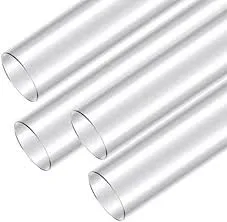nov . 02, 2024 03:05 Back to list
1 pvc irrigation pipe
Understanding 1% PVC Irrigation Pipe A Sustainable Solution for Agriculture
Irrigation plays a vital role in modern agriculture, ensuring crops receive the necessary water to thrive, especially in regions where rainfall is insufficient. One popular choice for irrigation systems is the 1% PVC irrigation pipe. This type of pipe not only offers durability and resistance to various environmental factors but also promotes efficient water usage, making it an ideal solution for sustainable farming practices.
What is 1% PVC Irrigation Pipe?
The term 1% PVC irrigation pipe generally refers to a specific type of polyvinyl chloride (PVC) pipe designed for irrigation purposes. The 1% typically indicates the pipe’s diameter or wall thickness in the context of its intended use, which can vary depending on the manufacturer's specifications. PVC, as a material, is known for its lightweight properties, corrosion resistance, and longevity, making it suitable for various agricultural applications.
Benefits of PVC Irrigation Pipes
1. Durability PVC pipes are resistant to corrosion and can withstand harsh environmental conditions. Unlike metal pipes, they do not rust or corrode over time, which ensures a longer lifespan and reduces maintenance costs.
2. Lightweight and Easy to Install The lightweight nature of PVC makes it easier to handle and install compared to other materials. This characteristic can significantly reduce labor costs and installation time, allowing farmers to set up their irrigation systems more efficiently.
1 pvc irrigation pipe

3. Cost-Effective PVC pipes tend to be more affordable than alternative irrigation materials, such as metal or concrete. Additionally, their long lifespan and minimal maintenance requirements contribute to reduced overall costs for farmers.
4. Water Efficiency Modern irrigation practices aim to minimize water wastage. PVC irrigation pipes can be designed to optimize water flow and distribution, ensuring that crops get the precise amount of water they need without excess runoff. This efficiency is crucial in promoting sustainable agriculture and conserving water resources.
5. Environmental Impact As agriculture faces increasing scrutiny regarding its environmental impact, the use of 1% PVC irrigation pipes can be aligned with sustainable practices. They can be manufactured with recycled materials and are fully recyclable themselves, reducing the carbon footprint associated with traditional irrigation systems.
Applications in Agriculture
1% PVC irrigation pipes are versatile and can be used in various agricultural settings. They are commonly employed in drip irrigation systems, where water is delivered directly to the plant roots, minimizing evaporation and runoff. This targeted approach is particularly beneficial in arid regions where water conservation is paramount. Additionally, they can be used in sprinkler systems, which provide an efficient way to irrigate larger fields.
Conclusion
The adoption of 1% PVC irrigation pipes represents a significant step towards sustainable agricultural practices. With their unique combination of durability, cost-effectiveness, and environmental benefits, these pipes provide farmers with an efficient method of delivering water to crops. As the world grapples with the challenges of climate change and food security, innovative irrigation solutions like 1% PVC pipes can help mitigate these issues, ensuring that agriculture remains resilient and productive for future generations. Investing in such technologies is not just beneficial for farmers but for the environment as well, paving the way for a more sustainable agricultural landscape.
-
Durable PP Rigid Sheet: Lightweight, Chemical Resistant Solutions
NewsAug.21,2025
-
PVC Grey Sheet for Extraction: Chemical Resistant & Durable
NewsAug.19,2025
-
Durable PVC Pipe Fittings for Plumbing & Irrigation Needs
NewsAug.18,2025
-
HDPE Steel Belt Reinforced Spiral Corrugated Pipe | High Strength
NewsAug.17,2025
-
HDPE Pipe Fittings: Durable, Leak-Proof Solutions
NewsAug.16,2025
-
Premium CPVC Sheet: High-Temp & Chemical Resistant Solutions
NewsAug.15,2025

